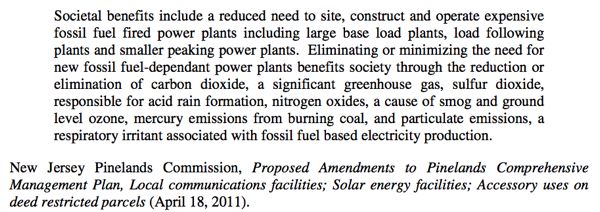It Was A Great Day for the Pinelands
Climate and Anti-pipeline activists gaining momentum
We had a minor but significant victory today in the Pinelands.
In response to many months of repeated public demands that the Pinelands Commission consider climate change impacts on the Pinelands and amend the Comprehensive Management Plan (CMP) to address climate and energy policies, today Commission Chairman Lohbauer announced that the Planning and Implementation Committee (P&I) would begin to consider the issue during their December meeting.
Lohbauer noted that Commissioner Lloyd also expressed support for that initiative and he asked staff to prepare briefing materials to begin that discussion for the December P&I meeting.
Lohbauer’s remarks today mark a significant change by the Commission.
The move follows intense discussion at last month’s meeting, when the Commission went into executive session to discuss whether they had legal authority to address climate change in the CMP. Presumably, given Lohbauer’s announcement, the answer to that legal question was yes, the Commission does have the authority.
Previously, Executive Director Wittenberg stressed that the CMP lacked standards to consider climate and legal Counsel Roth stated that the Commission lacked jurisdiction to address climate change.
In prior testimony and correspondence, we have urged the Commission to address a comprehensive set of climate and energy policies as amendments to the CMP, including:
- reduction of greenhouse gas emissions, or mitigation. The NJ Global Warming Response Act already sets a deep 80% reduction goal that could serve as a starting point;
- the science of impacts of climate change on the Pinelands, including a monitoring program;
- adaptation strategies to current and projected climate change impacts;
- promotion of energy efficiency and renewable energy;
- infrastructure policies that strongly discourage fossil infrastructure and require lifecycle carbon emissions analysis;
- land use review policies and practices that include net zero carbon building standards and offset requirements.
- Administrative moratorium on review of major fossil infrastructure or greenhouse gas emitting projects pending adoption of CMP safeguards.
Today, I reminded the Commission that they had previously acknowledged jurisdiction and the importance of climate change and promoting renewable energy in the April 2011 CMP amendment regarding solar: 
We look forward to the December P&I meeting and encourage readers to send supporting ideas, science and policy proposals to the Commission for consideration between now and then.
Today’s Hearing
The Commission’s hearing room today was packed, and 20 people provided almost 2 hours of testimony, most of which opposed the South Jersey Gas and NJ Natural Gas pipelines current pending approvals.
The testimony included calls to address climate change, to consider President Obama’s rejection of the Keystone XL pipeline and Gov. Cuomo’s veto of the Port Ambrose offshore LNG project, and to declare a moratorium on pipeline reviews.
“Times are changing” was the constant refrain and appeal to the Commission to change with the times and respond to public demands.
There was more excellent testimony on the fabricated military need for the NJ Natural Gas pipeline. That pipeline would not serve the Joint Base, but would provide enough gas to double the current number of NJNG residential and commercial consumers.
I reiterated my call for a halt to review of the NJNG application pending a referral and investigation by the NJ Attorney General’s office of potential fraud or misconduct, particularly in submitting and certifying a false application to the Commission.
There was an in depth interrogation of the question of exactly how we have arrived at the current “bizarre” situation with the South Jersey Gas pipeline by attorney Arnold Fishman, who called BPU a “shill” for SJG (a “bizarre” situation I have called “legally absurd”).
In an almost courtroom like interrogation, Fishman asked detailed questions on exactly what the basis for the Certificate of Filing was and how the prior findings of inconsistency with the CMP were reversed. Fishhman pinned down regulatory officer Chuck Horner, who repeatedly evaded and obfuscated the “primarily serve only the Pinelands” standard, at one point causing Chairman Lohbauer to intercede on his behalf and in the process make an embarrassing mistake by saying that that standard did not apply (which he later apologized for).
Former California utility power engineer George Hay noted multiple large energy projects in the region. He objected to what appear to be anti-competitive market manipulation practices, opposed how SJG subsidizes investor risks with ratepayer money, and connected many dots, from the Philadelphia “energy hub” concept to the Wolff & Samson law firm’s involvement, suggesting potential corruption on a scale of Bridgegate, United Airlines “Chairman’s flights”, and Atlantic City airport investigations. He called for a two year time out to sort these issues out.
In an unusual move, a reporter from the Press of Atlantic City even stood up during the public comment period to ask the commission why it was going into executive session to discuss broad issues about the SJG pipeline review process (previously, Chairman Lohbauer stated that the Commissioner would go into executive session to discuss a letter from Carleton Montgomery of PPA regarding the Commission’s role and the review procedure for the SJG pipeline).
All in all, it was quite a day – we need to keep up and expand the pressure.
It clearly is working – the Commission seemed on it heels today.

Pingback: WolfeNotes.com » Pinelands Commission Executive Director Wittenberg Tries to Derail Consideration of Climate Change
Pingback: WolfeNotes.com » Gov. Christie Cans Pinelands Commission Chairman
Pingback: WolfeNotes.com » Despite Bare Bones Budget And 22 Vacant Professional Positions, The Pinelands Commission Has No Idea If Gas Companies Are Paying The Full Costs Of Oversight
Pingback: WolfeNotes.com » The State Of NJ Has Gone BACKWARDS On Climate Change Policy Over The Last 30 Years
Pingback: The Pine Barrens Preservation | Environmental & Sustainability Planning @ Rowan University